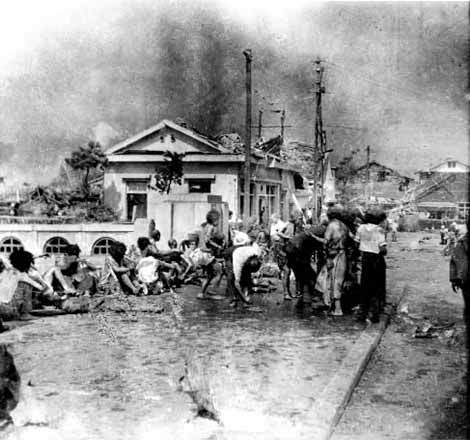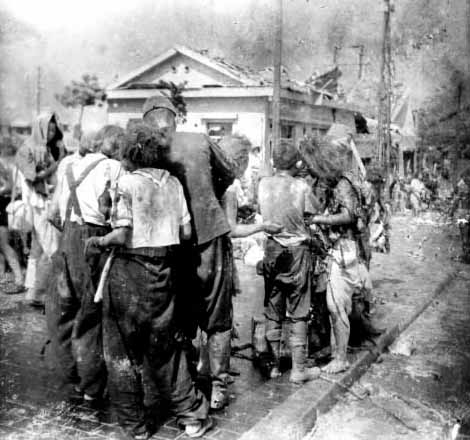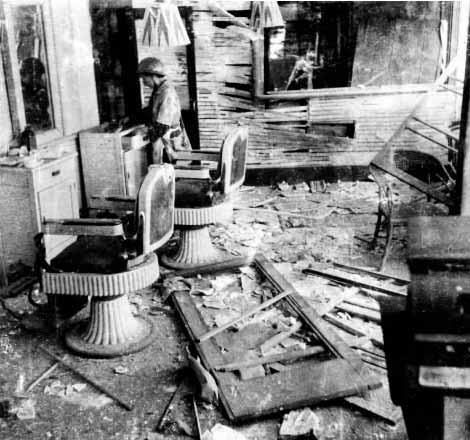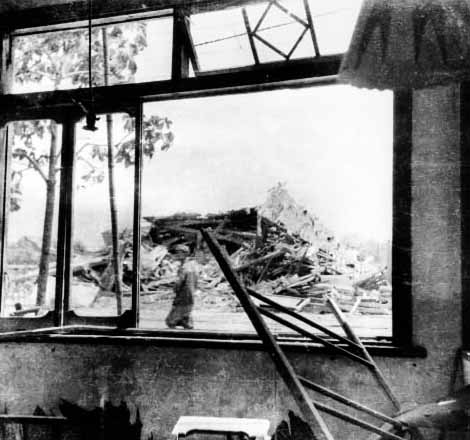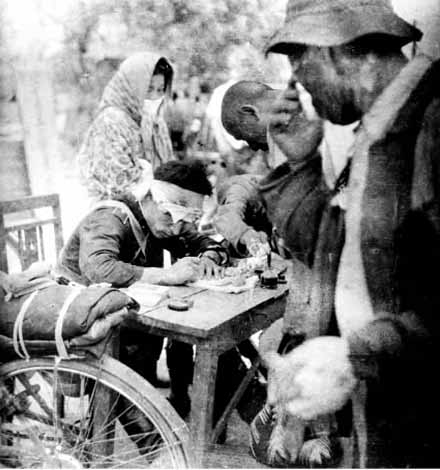- A-bomb Images
- Photographs convey the misery of the bombing
Photographs convey the misery of the bombing
In August 2002, Yoshito Matsushige, then 89, spoke to the Chugoku Shimbun about his experience as a photographer during the bombing. Mr. Matsushige passed away at the age of 91 on January 16, 2005.
“I felt very uncomfortable taking photographs of the wounded. When I focused on their faces through the viewfinder and saw them gazing back at me, it became even more difficult to press the shutter. But if I hadn't taken any photos after such devastation, I would have regretted it forever. I was determined, then, to capture at least a few scenes, but it still took twenty or thirty minutes to gather my nerve and take that first picture.
When I was set to take the second picture, my own tears clouded the viewfinder. I was crying, distraught that the United States would do such a terrible thing to other human beings. I felt such sorrow for the suffering these people were experiencing.
In hindsight, I believe it was important I took photographs that day. Though other photographers recorded the aftermath of the bombing, I was the only one able to capture moments from August 6th. So the five pictures I managed to take can help convey the full horror of the atomic bombing.
On the day of the bombing, I had breakfast at home in Midorimachi, 2.7 kilometers from the hypocenter. I left the house by bicycle before 8:00a.m. but returned shortly after to use the bathroom. If I hadn't gone back home, I would have been exposed to the bomb much closer to the hypocenter.
The photographs were printed for the first time in the Chugoku Shimbun's evening edition of July 6, 1946-almost one year later. In retrospect, I wish they could have been shown to the public earlier because they convey, with real power, the misery caused by the world's first atomic bombing. But the mission of these photos will never end until all nuclear weapons have been abolished from the earth. If I could, I would encourage them on, urging them to ‘stick to your task until the very end.’
Nuclear weapons are emphatically evil and war itself is abhorrent. If a war is waged, these weapons could ultimately be used. If we fail to respect our fading experience of war, we risk catastrophic consequences. We are duty bound, then, to convey the reality of the atomic bombing to the youth of today.”
“I felt very uncomfortable taking photographs of the wounded. When I focused on their faces through the viewfinder and saw them gazing back at me, it became even more difficult to press the shutter. But if I hadn't taken any photos after such devastation, I would have regretted it forever. I was determined, then, to capture at least a few scenes, but it still took twenty or thirty minutes to gather my nerve and take that first picture.
When I was set to take the second picture, my own tears clouded the viewfinder. I was crying, distraught that the United States would do such a terrible thing to other human beings. I felt such sorrow for the suffering these people were experiencing.
In hindsight, I believe it was important I took photographs that day. Though other photographers recorded the aftermath of the bombing, I was the only one able to capture moments from August 6th. So the five pictures I managed to take can help convey the full horror of the atomic bombing.
On the day of the bombing, I had breakfast at home in Midorimachi, 2.7 kilometers from the hypocenter. I left the house by bicycle before 8:00a.m. but returned shortly after to use the bathroom. If I hadn't gone back home, I would have been exposed to the bomb much closer to the hypocenter.
The photographs were printed for the first time in the Chugoku Shimbun's evening edition of July 6, 1946-almost one year later. In retrospect, I wish they could have been shown to the public earlier because they convey, with real power, the misery caused by the world's first atomic bombing. But the mission of these photos will never end until all nuclear weapons have been abolished from the earth. If I could, I would encourage them on, urging them to ‘stick to your task until the very end.’
Nuclear weapons are emphatically evil and war itself is abhorrent. If a war is waged, these weapons could ultimately be used. If we fail to respect our fading experience of war, we risk catastrophic consequences. We are duty bound, then, to convey the reality of the atomic bombing to the youth of today.”

